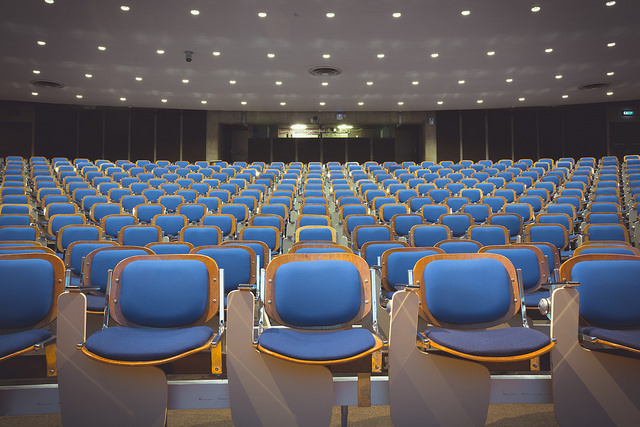Trinity students could have all large lectures held online permanently in the future, after a recommendation that lecture theatres with a capacity of over 100 be repurposed for “collaborative learning”.
A confidential discussion paper seen by The University Times outlines what College could look like with the implementation of new technologies to enhance teaching and learning.
The paper was drafted by the Trinity Futures Group, consisting of some of the most senior people in College, and made a number of other suggestions about how changes brought about by the coronavirus could be made permanent.
The document notes that “Trinity will need to consider how to position its academic offerings in the post-Covid context, building on the accelerated use of technology by staff and students”.
“The future of Trinity”, it says “will likely be an evolving blend of physical and digital learning (“phygital”) with implications for pedagogy, space, infrastructure investment, new student markets and education & technology research”.
“If lectures for large classes were moved to online delivery than that space could be repurposed to create more flexible spaces”, the report says. It noted that classrooms and lecture theatres with a capacity of more than 100 take up a total of 5,700 square metres of space on campus.
“Since most of the large lecture theatres are tiered,”, it added, “their adaptability would arise from installing new furniture to facilitate collaborative learning”.
The group thus recommended that College “move all large class lectures (>100) to online delivery (synchronous or asynchronous) so that large lecture theatres can be reconfigured to facilitate collaborative learning”.
The report also mooted the use of lecturer holograms “being projected into a student’s visual space”. This, the group argued, “could facilitate a more engaging experience instead of a ‘talking head’ online delivery”.
The cost of providing virtual-reality lectures could be costly in the short term, the report noted, but “augmented reality does not require expensive hardware”.
“Immersive technology is an area that Trinity should be considering for the future and Trinity’s research expertise in this area should be harnessed to develop innovative educational approaches.”
The Trinity Futures group did not recommend that undergraduate teaching transition to a permanent online-only structure. Instead it advocated for the use of technology to enhance and support teaching and learning, such as “provision of online content, lecture capture, collaborative group activities, online polling and student-led discussions, and online assessments”. These “can be provided via the existing learning management system”.
The report mooted the introduction of the “flipped classroom”, which “incorporates pre-class assignments and in-class learning activities”. Online material such as a prerecorded lecture is provided in advance of a timetabled class, which is “devoted to reinforcing and enhancing the students’ online learning, using group work, demonstrations and peer-to-peer learning”.
This model has already been trialled by the School of Biochemistry & Immunology with 320 Freshman students. Some 81 per cent of students involved in the trial said the flipped-classroom model “significantly increased their workload”, but 87 per cent voted to keep it. Just over three-quarters of those involved said the flipped classroom “increased their understanding of module topics”.
The group is also recommending that College increase the number of fully online postgraduate courses – there are currently seven.
The report also included five potential future projects for Trinity Futures, including the introduction of AI chatbots. The report recommended that College “establish a working group to develop proposals for the next wave of Digital Trinity projects”.







